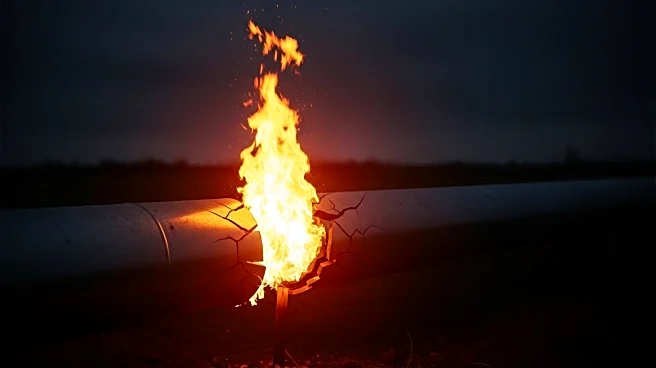What is the story about?
What's Happening?
Ukraine has launched a significant attack on the Korobkovsky Gas Processing Plant, one of Russia's largest gas facilities, and an oil transportation station in Yefimovka. This action is part of an ongoing energy war between Russia and Ukraine, as both nations aim to disrupt each other's domestic gas supply ahead of the winter months. Ukrainian President Volodymyr Zelenskyy has praised the effectiveness of Ukraine's long-range strikes, which have reportedly caused a 20% fuel shortage in Russia. The strikes utilized newly developed missiles and drones, including the Palianytsia missile and Ruta missile drone, which have successfully targeted Russian military depots and offshore oil platforms.
Why It's Important?
The escalation in targeting energy infrastructure is crucial as it directly impacts the ability of both countries to maintain domestic gas supplies during the harsh winter. For Ukraine, the destruction of 60% of its gas production by Russian strikes means it will need to import $2.2 billion worth of fuel, placing a significant economic burden on the country. Conversely, Russia's fuel shortage could pressure its leadership and affect its military operations. The energy conflict highlights the strategic importance of energy resources in geopolitical conflicts and could influence international support and alliances.
What's Next?
As the energy war intensifies, both countries are likely to continue targeting each other's energy infrastructure. Russia has already imposed restrictions on gasoline and diesel exports until the end of 2025, indicating a long-term strategy to manage its domestic supply. Ukraine may seek further international support to mitigate its fuel import costs and bolster its energy security. The ongoing conflict could lead to increased diplomatic efforts or further military escalations, depending on the effectiveness of these energy strikes.
Beyond the Headlines
The targeting of energy infrastructure raises ethical and legal questions about the conduct of war and the impact on civilian populations. Energy shortages can lead to humanitarian crises, affecting millions of people who rely on consistent energy supplies for heating and electricity. The conflict also underscores the vulnerability of critical infrastructure in modern warfare, prompting discussions on international regulations and protections for such facilities.















